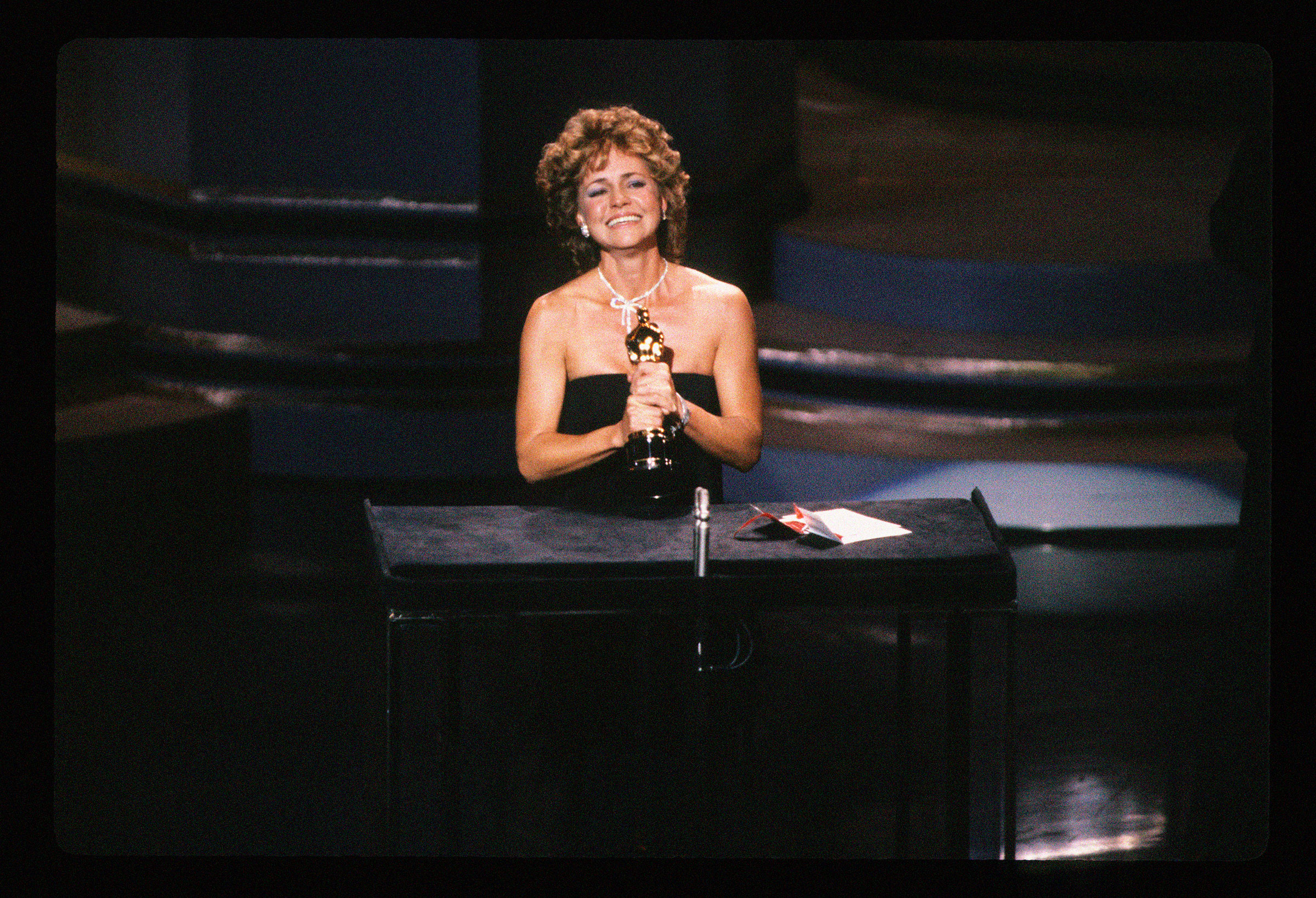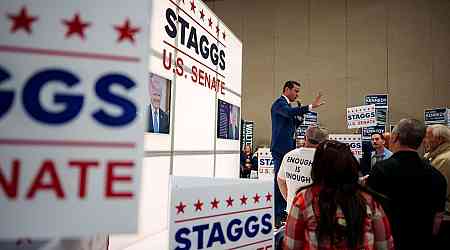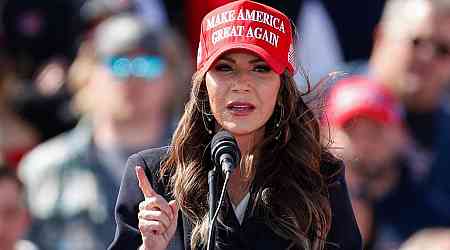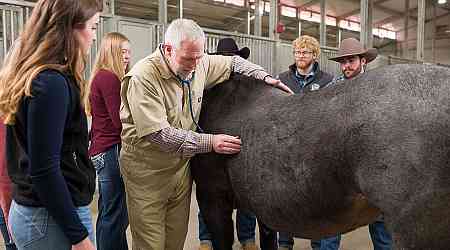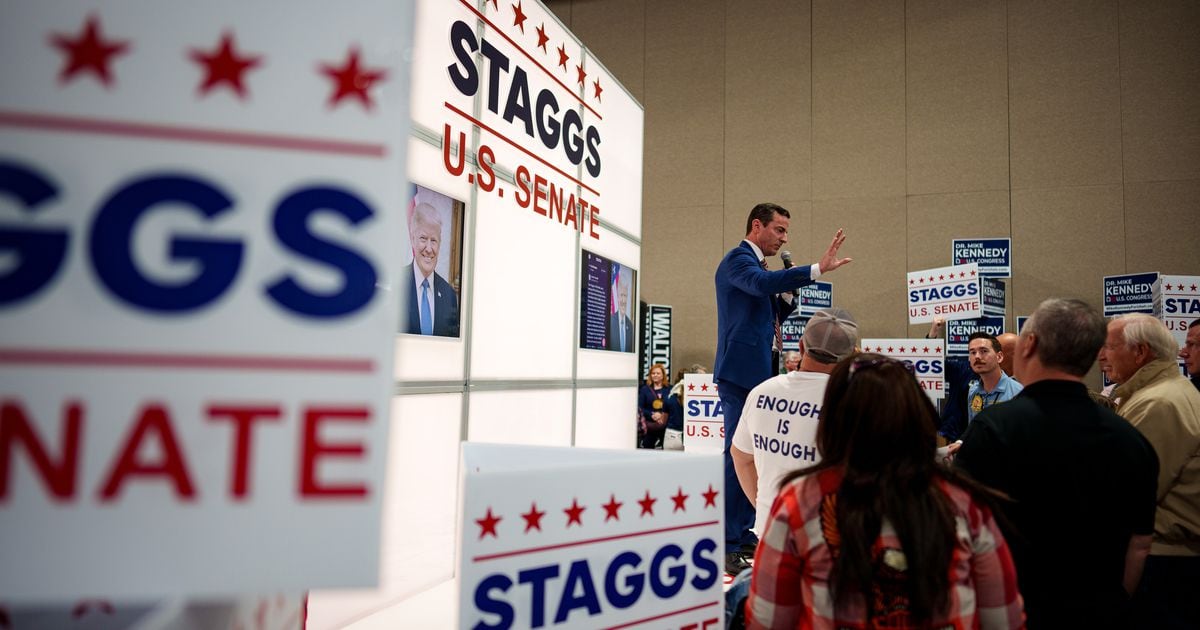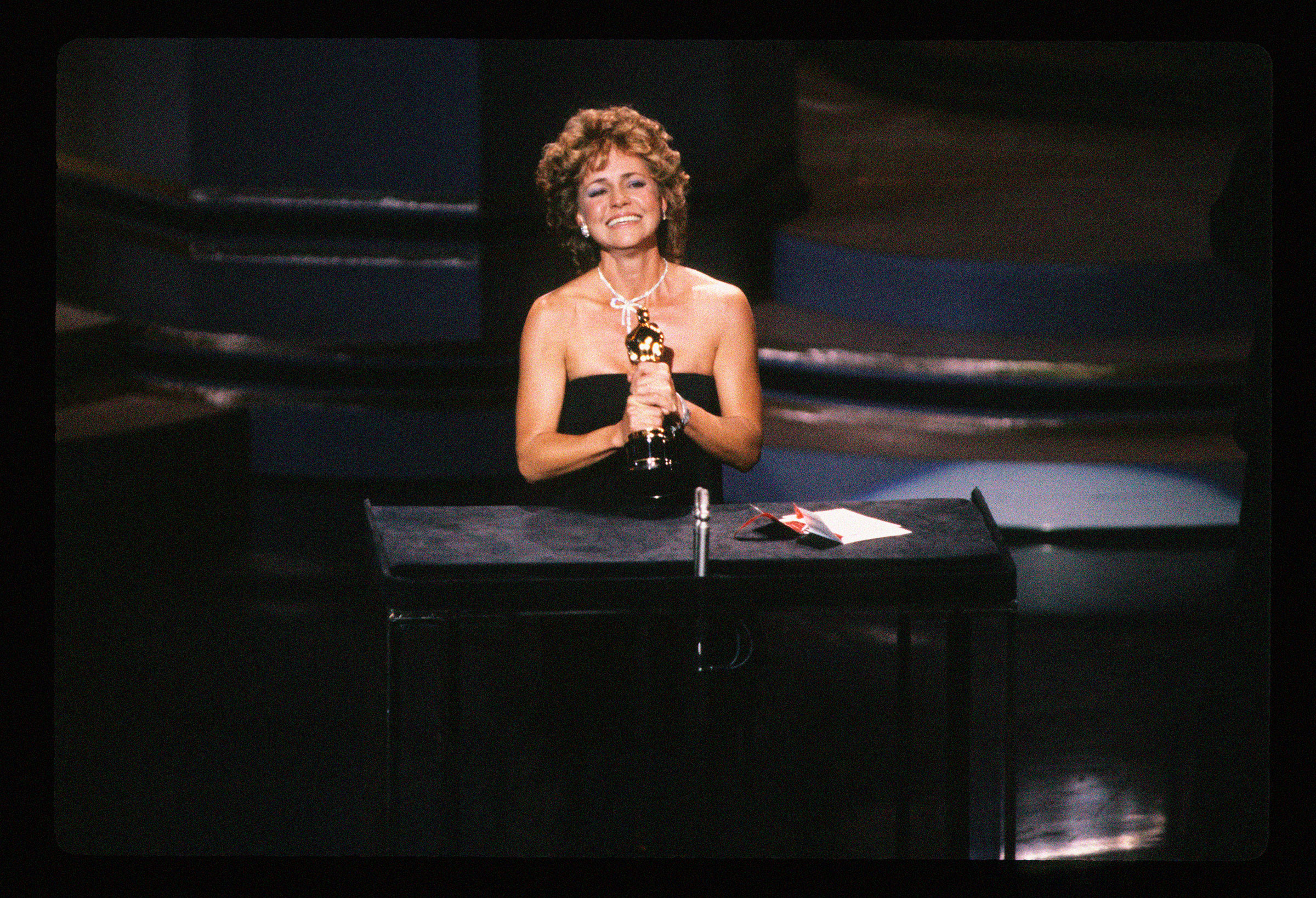
The most memorable Academy Awards speeches are those that stay with you long after the ceremony is over. Those that feel raw, emotional, and sometimes even a little unhinged because they are being given by someone who is genuinely shocked to hear their name called on Hollywood’s biggest night. Think Olivia Colman’s charming 2019 speech in which she ended by shouting out Lady Gaga who she spotted in the front row because, well, Lady Gaga!
[time-brightcove not-tgx=”true”]Sometimes a speech sticks in your head because the winner makes Oscar history; it’s hard not to be moved by the heartfelt words Hattie McDaniel spoke when she became the first Black American to ever win an Oscar, for Gone With the Wind, in 1940. Other times the speech makes an unforgettable political statement, as when Indigenous actor and activist Sacheen Littlefeather accepted Marlon Brando’s Oscar for The Godfather on his behalf, in an act of protest.
From Jennifer Lawrence tripping up the stairs to Tom Hanks’ passionate tribute to the LGBTQ+ community, these are the 29 most memorable speeches in Oscar history.
Sally Field Didn’t Say What You Thought She Said
When Sally Field won the Best Actress Oscar in 1985 for Places in the Heart, she said three words that would live in pop culture infamy: “You like me.” The Academy really did; she won the same award just five years earlier for her performance as the titular union organizer in Norma Rae. But the line from her speech that has been endlessly spoofed by everyone, including Field herself, has been remembered all wrong. She didn’t actually say, “You like me. You really like me.” She said, “I can’t deny the fact that you like me. Right now, you like me!”
Whether you like her speech or not, Field has chosen to stop caring what anyone thinks about it. “First of all, I was winning my second Oscar,” she told New York Magazine in 2017. “So I’m allowed to say anything I f-cking want.” It’s hard to argue with a two-time Oscar winner.
Patricia Arquette Inspires a Beautiful Meryl Streep GIF
When Patricia Arquette won Best Supporting Actress for Boyhood in 2015, she used her speech to stump for gender equality. “To every woman who gave birth. To every taxpayer and citizen of this nation,” she said. “We have fought for everybody else’s equal rights. It’s our time to have wage equality once and for all and equal rights for women in the United States of America.” While Arquette’s speech had its critics, she found fans in fellow nominee Meryl Streep and Jennifer Lopez, whose supportive responses turned them into the perfect GIF for those times when you need to hype yourself up.
Hattie McDaniel Makes Bittersweet History
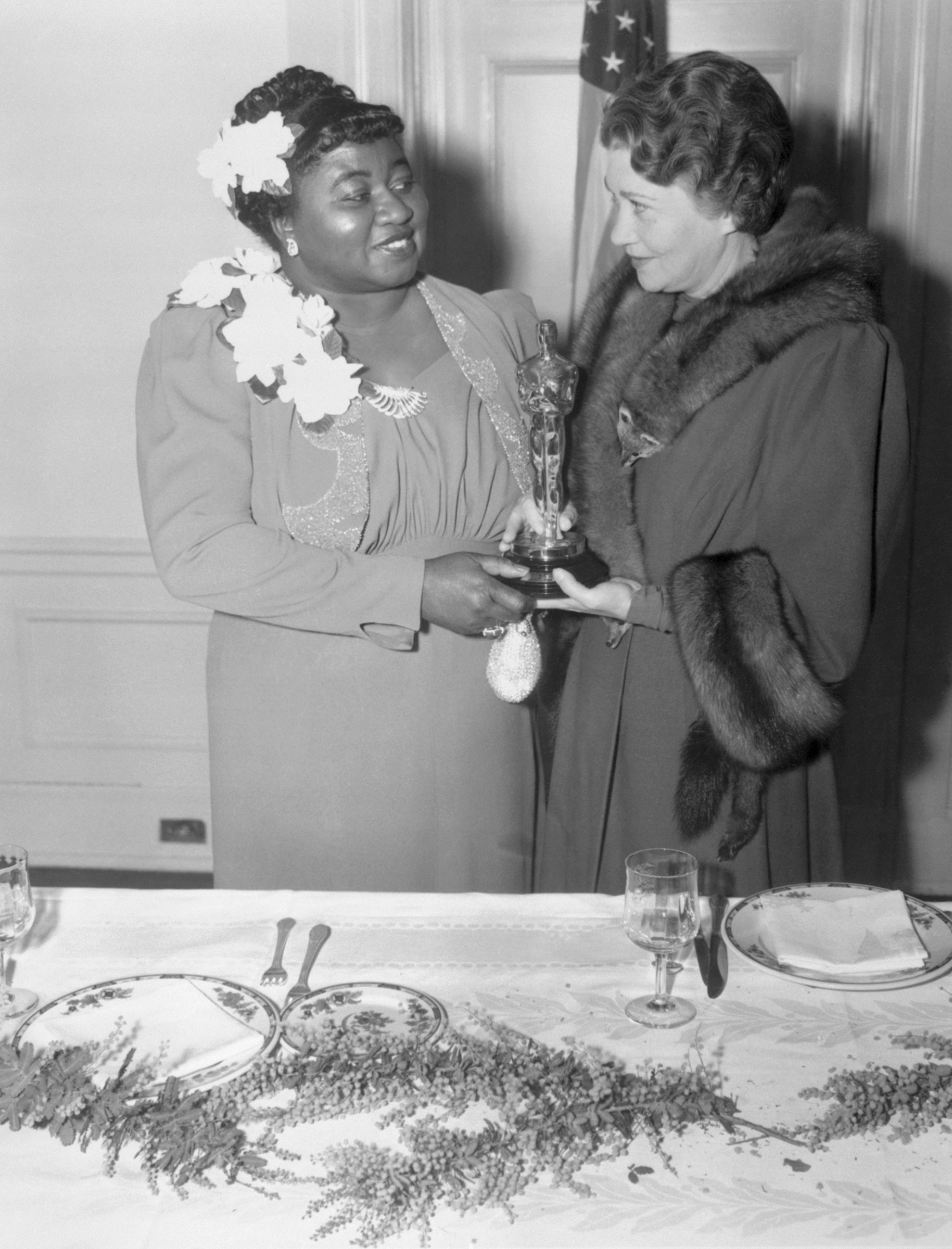
In 1940, Gone With the Wind’s Hattie McDaniel became the first African American to ever win an Academy Award, but she was almost not allowed to attend the ceremony. Her film’s producer David O. Selznick had to ask the then segregated Ambassador Hotel for permission to invite McDaniel, which they granted, but she was relegated to a separate table away from her white co-stars.
Yet despite this, McDaniel, the daughter of formerly enslaved Americans, graciously thanked the Academy for their “kindness” in her Best Supporting Actress speech, which was not the one Selznick had prepared for her. She instead delivered a more personal one that she had written with help from her close friend Ruby Berkley Goodwin. “It has made me feel very, very humble, and I shall always hold it as a beacon for anything I may be able to do in the future,” McDaniel said. “I sincerely hope I shall always be a credit to my race and to the motion picture industry.”
Following her win, McDaniel would become a polarizing figure in the Black community, with some arguing that she made a career out of playing racial stereotypes. Historian Jill Watts, who wrote the 2007 biography Hattie McDaniel: Black Ambition, White Hollywood, believes McDaniel’s place in Hollywood has been misunderstood. “She’s an artist who’s been resisting white domination with performance—up until she becomes involved in white show business,” Watts told Entertainment Weekly last year. “If you watch those performances, she’s straitjacketed [by the writing], but she’s trying to move her way out of that.”
Sacheen Littlefeather Rejects Marlon Brando’s Oscar
When Marlon Brando won the Best Actor Oscar for The Godfather in 1973, he chose to boycott the ceremony, sending Apache and Yaqui actor and activist Sacheen Littlefeather in his place. The then-26-year-old respectfully refused the honor on his behalf in protest of Hollywood’s treatment and portrayal of Native Americans in film. Her speech received cheers, but also jeers from the crowd. (It has been reported that John Wayne was so angered by Littlefeather’s speech that he had to be restrained by security guards so he wouldn’t storm the stage.)
In 2022, four months before Littlefeather’s death, the Academy formally apologized to her for how she was treated that night. Littlefeather told The Guardian in 2021 that despite the boos she always knew what she had done that day was a necessary disruption. “It was not a performance, it was a real presentation,” she said. “I think that’s what took people by surprise: that it was so real. It really touches people’s hearts to this day.”
The Time the Oscars Got the Wrong Envelope
And the winner is … not La La Land. But for a few minutes in 2017, the cast and crew of the Damien Chazelle musical believed that they had won Best Picture. After all, presenter Faye Dunaway announced their film’s name as the winner. La La Land’s producers were in the middle of giving their victory speeches when the truth was revealed: There was a mix-up with the envelopes and Moonlight had actually won the night’s top prize. It was one of the most shocking moments in Oscars history, and there are photos to prove just how flabbergasted stars like Matt Damon, Meryl Streep, and Busy Philipps felt in the moment that was very much happening live.
Amidst all the hullabaloo, Moonlight director Barry Jenkins managed to give a speech that embraced the joy, but also the absurdity of the moment. “Very clearly, very clearly, even in my dreams, this could not be true,” he said. “But to hell with dreams, I’m done with it, ’cause this is true. Oh my goodness.”
Joe Pesci Proves He Is a Man of Few Words
With just five words, Joe Pesci gave one of the most memorable Oscar speeches of all time. After winning Best Supporting Actor for Goodfellas in 1991, he walked up to the podium, shook his head in disbelief, and said, “It was my privilege. Thank you.” Later, when Pesci returned to the stage as a presenter, he smiled and said, “I still can’t talk,” amusing the crowd—but definitely not like a clown.
Irving Berlin Gives the Academy Award to Irving Berlin
Composer and lyricist Irving Berlin has the unique honor of handing the statue for Best Original Song to himself. In 1943, when he won the prize for his song “White Christmas” from Holiday Inn, he was also the award’s presenter. According to the Los Angeles Times, after opening the envelope and seeing his name, he told the crowd, “I’m glad to present the award. I’ve known him for a long time.”
Anna Paquin Is Nearly Speechless
Anna Paquin won Best Supporting Actress for The Piano in 1994 when she was just 11 years old, becoming one of the youngest performers to ever win an Academy Award. (Tatum O’Neal holds the record for the youngest Oscar winner, having won Best Supporting Actress statue 20 years earlier at the age of 10 for Paper Moon.) So you can’t blame the girl for being in utter shock when she heard her name called. For nearly 23 seconds, she stood at the podium wide-eyed in her adorable bedazzled beret searching for the right words to say. It’s one of the purest displays of shock and joy you’ll ever see.
Roberto Benigni Shows How to Make an Entrance
When Life Is Beautiful won the Oscar for Best Foreign Language Film (now known as the Best International Feature Film) in 1999, the Italian film’s director, writer, and star Roberto Benigni made his way to the stage by climbing over the furniture and then bunny-hopping up the stairs into the arms of presenter Sophia Loren. The bit of acrobatics earned him a standing ovation, but he was too excited to even notice, telling the crowd, “I want to kiss everybody.” With all of that energy, we wouldn’t have put it past him to do it.
Bong Joon Ho Pays Tribute to Martin Scorsese
By the time Bong Joon Ho had won Best Director for 2019’s Parasite, he had already collected awards for Best Original Screenplay and Best International Feature. So it was no surprise he wanted to talk about someone other than himself when he reached the podium that third time. “When I was young and studying cinema there was a saying that I carved deep into my heart, which is, ‘The most personal is the most creative,’” he said with help from his translator Sharon Choi. “That quote was from our great Martin Scorsese.” The line earned Scorsese, who was nominated for The Irishman, a standing ovation and showed just how much he means to a new generation of filmmakers.
Halle Berry Knew the Moment Was Bigger Than Her
In 2002, Halle Berry became the first Black woman to win Best Actress, for her film Monster’s Ball. In her speech she paid tribute to those who came before her, including Dorothy Dandridge, who, in 1955, became the first African American woman nominated in that category. And those actresses who stood beside her in the fight for equality in Hollywood: Jada Pinkett Smith, Angela Bassett, Vivica A. Fox. “This moment is so much bigger than me,” Berry said through tears, adding, “It’s for every nameless, faceless woman of color that now has a chance because this door tonight has been opened.”
Olivia Colman Is All of Us
Olivia Colman didn’t expect to win Best Actress for The Favourite in 2019 so, lucky for us, she hadn’t prepared a speech. Instead, when she got to the stage, she admitted how stressful award shows can be, apologized to fellow nominee (and projected winner) Glenn Close for stealing her thunder, and blew a kiss to Lady Gaga. All in all it may go down as the most relatable speech in Academy Awards history.
Adrien Brody’s Cringeworthy Kiss
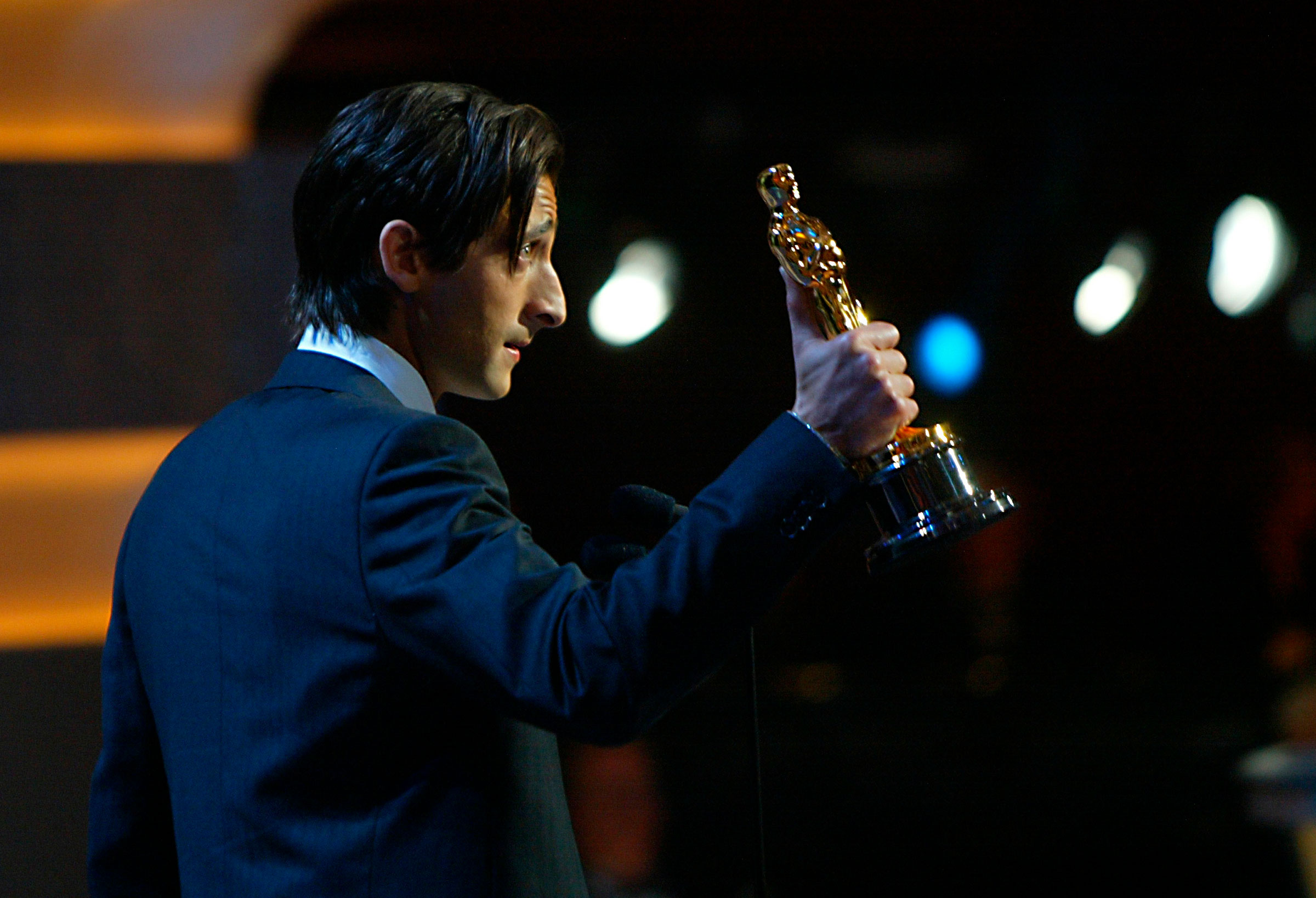
In 2003, 29-year-old Adrien Brody went home with a little gold man for his Best Actor win for The Pianist, becoming the youngest actor to ever take home that prize. But not before stealing a kiss from his category’s presenter Halle Berry. “I bet they didn’t tell you that was in the gift bag,” he said after the off-the-cuff embrace, which reads as completely cringe now.
Brody called the kiss one of the “most memorable moments ever. You could say time slowed down,” he told Vanity Fair in 2017. But Berry told Watch What Happens Live in 2017 that she was completely taken aback by the non-consensual smooch. “I was like, ‘What the f-ck is happening right now?!’” she joked. “And because I was there the year before and I know the feeling of being out of your body, I just f-cking went with it.” Maybe Berry deserves a second Oscar for that performance.
Rita Moreno Keeps it Short and Sweet
Rita Moreno made history when she won the Best Supporting Actress statue for West Side Story in 1962. Moreno, who is Puerto Rican, became the first Latina to win an acting Oscar. She also gave one of the shortest speeches in Academy Award history, saying just 11 words in seven seconds: “I can’t believe it! Good Lord. I leave you with that.”
In 2022, Moreno told the New York Times that she was convinced that Judy Garland was going to win the prize for her performance in Judgment at Nuremberg, and was even practicing her “loser face” for when the camera inevitably panned to her. But, when she won, she decided that she wasn’t going to thank anyone. “They didn’t give you the part as a favor,” she remembered thinking. “They were forced to give it to you because you did the best screen test.” Once she made that decision, she realized she didn’t have anything else to say. “And,” she told the Times. “I’ve been trying to make up for it with long acceptance speeches ever since.”
Glen Hansard and Markéta Irglová Get a Second Try
The Once songwriters won for Best Original Song in 2008, but only Glen Hansard was able to give a speech. Just as Markéta Irglová stepped in front of the microphone, the orchestra began playing the duo off the stage. Luckily, host Jon Stewart invited Irglová back to the podium so she could get a chance to deliver a lovely dedication to all the dreamers out there. “The fact that we’re standing here tonight, the fact that we’re able to hold this [award] is just proof that no matter how far out your dreams are, it’s possible,” she said. “Fair play to those who dare to dream, and don’t give up.”
James Cameron Becomes King of the Oscars
Titanic ruled the 1998 Academy Awards, taking home 11 awards, tying it with 1959’s Ben-Hur for most wins. (Lord of the Rings: Return of the King has since joined those two films, tyingthat record in 2004.) Perhaps all that gold went to Cameron’s head. In his Best Director speech, he quoted his film’s iconic “I’m king of the world” line and barked like a dog. Almost immediately, Cameron regretted the self-referential choice. “[Warren Beatty] was just looking at me like, ‘You poor boob, what the f-ck did you just do?’” he told the Hollywood Reporter in 2023. “And I went, ‘Oh, was that not cool? OK.’”
Jennifer Lawrence’s Oscar-worthy Trip and Fall
After winning Best Actress for Silver Linings Playbook in 2013, Jennifer Lawrence stumbled on her way to the Oscar stage. Her beautiful floor-length Dior gown may have tripped her up, but she didn’t miss a beat once she finally got to the podium. “You guys are just standing up because you feel bad that I fell and that’s really embarrassing,” she said. “But thank you. This is nuts.”
Ben Affleck and Matt Damon Get Hyped
Childhood besties Ben Affleck and Matt Damon were in their twenties when they won their first Oscar for Best Original Screenplay in 1998. (At 25, Affleck became the youngest person to ever win an Academy Award for screenwriting.) So when the Good Will Hunting writers took the stage, they couldn’t hide their youth. “I just said to Matt, losing would suck and winning would be really scary,” Affleck said to open their speech. “It’s really, really scary.” Perhaps, that’s why Affleck’s voice cracked as he thanked everyone they knew including their moms, who were also their dates.
Michelle Yeoh Proves Age Is Just a Number
In 2023, Michelle Yeoh became the first Southeast Asian woman to win Best Actress for her performance in Everything Everywhere All At Once. “For all the little boys and girls who look like me watching tonight, this is a beacon of hope and possibilities,” she said. “This is proof that dreams dream big, and dreams do come true.” But the 60-year-old actress also gave a special shoutout to those women of a certain age. “And, ladies,” she said. “Don’t let anybody tell you you are ever past your prime.”
Michael Moore Gets Political and Gets Booed
When Michael Moore won Best Documentary for Bowling For Columbine in 2003, he decided to get political with his speech. Many in the crowd, however, seemed uninterested in hearing his opinions on President George W. Bush, booing at the first mention of the U.S.’s invasion of Iraq to destroy weapons of mass destruction, which had happened only days earlier. The less than supportive reaction didn’t stop the director from admonishing the Commander in Chief. “We are against this war, Mr. Bush!” Moore shouted just as the music began to play him off. “Shame on you, Mr. Bush! Shame on you!”
In a 2017 op-ed for the Hollywood Reporter, Moore wrote that despite the criticisms of his speech at the time, he knows that he was right to speak out against the U.S. government’s false claims that Iraq had WMDs. “People would later remember,” he wrote, “I’m ‘that guy who told the truth.’”
Sidney Poitier’s Speech Lives up to the Moment
Sidney Poitier’s 1964 win for Best Actor in Lilies of the Field marked the first time a Black man had ever won in that category. It was a monumental win for the man who broke the color barrier in Hollywood, becoming a matinee idol who played characters that explored the full Black experience at a time when Black actors were too often expected to play racist stereotypes.
“Because it is a long journey to this moment I am naturally indebted to countless numbers of people,” Poitier said before thanking his Lilies of the Field director and co-stars, as well as the members of the Academy. “For all of them, all I can say is a very special thank you.”
Jack Palance Shows Why You Shouldn’t Skip Arm Day
At the age of 73, Jack Palance won Best Actor in a Supporting Role for City Slickers. He celebrated his 1992 win by doing three one-armed push ups on stage to let Hollywood know that he wasn’t planning on slowing down anytime soon. And he didn’t; he appeared in nine more movies before his death in 2006 at the age of 87.
Viola Davis Proves Why She’s the GOAT
Viola Davis began her 2017 Best Supporting Actress speech for Fences in the cemetery. “You know, there’s one place that all the people with the greatest potential are gathered. One place. And that’s the graveyard,” she said. “People ask me all the time, ‘What kind of stories do you want to tell, Viola?’ And I say, exhume those bodies. Exhume those stories.” She went on to explain that as an actor she gets to tell the stories of those ordinary people who live phenomenal lives. It’s only fitting then that she ended her emotional speech by thanking her parents, “the people who taught me, good or bad, how to fail, how to love, how to hold an award, how to lose.” It also seems that they taught her how to give a speech for the ages.
Ruth Gordon’s Win Boosts Her Ego
Ruth Gordon made her film debut in 1915, but it took another 50 years for her to win an Oscar. In 1969, when she won Best Actress in a Supporting Role for Rosemary’s Baby, she admitted that the little gold man was a boost to her self-esteem. “I can’t tell you how encouragin’ a thing like this is,” she told the audience, before thanking those who voted for her. “And all of you who didn’t,” she said, “please excuse me.”
Marion Cotillard’s Perfect Hollywood Ending
Marion Cotillard began her 2008 Best Actress speech for the Edith Piaf biopic La Vie en Rose by telling the crowd that she was speechless. The French actress then went on to deliver a speech so quotable that it felt as if it had been written by a Hollywood screenwriter. “Thank you life, thank you love,” she said in English. “And it is true, there is some angels in this city.”
Denzel Washington’s Honors Sidney Poitier With Grace & Humor
Nearly 40 years after Sidney Poitier’s historic Best Actor win, Denzel Washington became the second Black man to take home the prize. (He had previously won for Supporting Actor in Glory in 1990.) Fittingly, Washington’s 2002 win happened on the same night Poitier received his honorary Oscar, a bit of happenstance that the Training Day actor just couldn’t ignore. “Forty years I’ve been chasing Sidney, they finally give it to me, what’d they do? They give it to him the same night,” he joked before gracefully paying tribute to the icon. “I’ll always be chasing you, Sidney. I’ll always be following in your footsteps,” he said. “There’s nothing I would rather do, sir. Nothing I would rather do.”
Cuba Gooding Jr. Won’t Be Played Off
When Cuba Gooding Jr. won Best Supporting Actor for Jerry Maguire in 1997, he knew he didn’t have much time. “I’m gonna rush and say everybody, and you cut away, I won’t be mad at you,” he said. And when the Academy attempted to play him off, he just kept going, screaming his thank yous loud enough to be heard over the orchestra. Gooding’s career hasn’t reached similar heights since then, and in 2022 he pleaded guilty to a harassment charge. But all these years later, it remains one of the most exuberant speeches in Oscars history.
Tilda Swinton Thanks George Clooney and His Bat-Nipples
Tilda Swinton began her 2008 Best Supporting Actress speech by admitting that her agent looked very much like an Oscar. “Truly the same shape head,” she said. “And, it has to be said, the buttocks.” She ended it by thanking her Michael Clayton costar George Clooney for “the seriousness and the dedication to your art. Seeing you climb into that rubber bat suit from Batman & Robin, the one with the nipples, every morning under your costume, on the set, off the set, hanging upside-down at lunch,” she said. “You rock, man.” For many, it was a charming introduction to an actress whose talent knows no bounds—nor, apparently, do her speeches.
Tom Hanks Brings the Audience to Tears
In 1994, Tom Hanks won Best Actor for Philadelphia, in which he plays an attorney who faces discrimination because he is gay and has AIDS. Hanks seemed to understand the importance of this moment and used it to pay tribute to his high school drama teacher Rawley Farnsworth and his classmate John Gilkerson. “Two of the finest gay Americans, two wonderful men that I had the good fortune to be associated with, to fall under their inspiration at such a young age,” he said. “I wish my babies could have the same sort of teacher, the same sort of friends.”
Hanks then eulogized AIDS victims including Gilkerson, an actor and puppeteer who died in 1989. “The streets of heaven are too crowded with angels,” he said with tears in his eyes. “We know their names.”


















